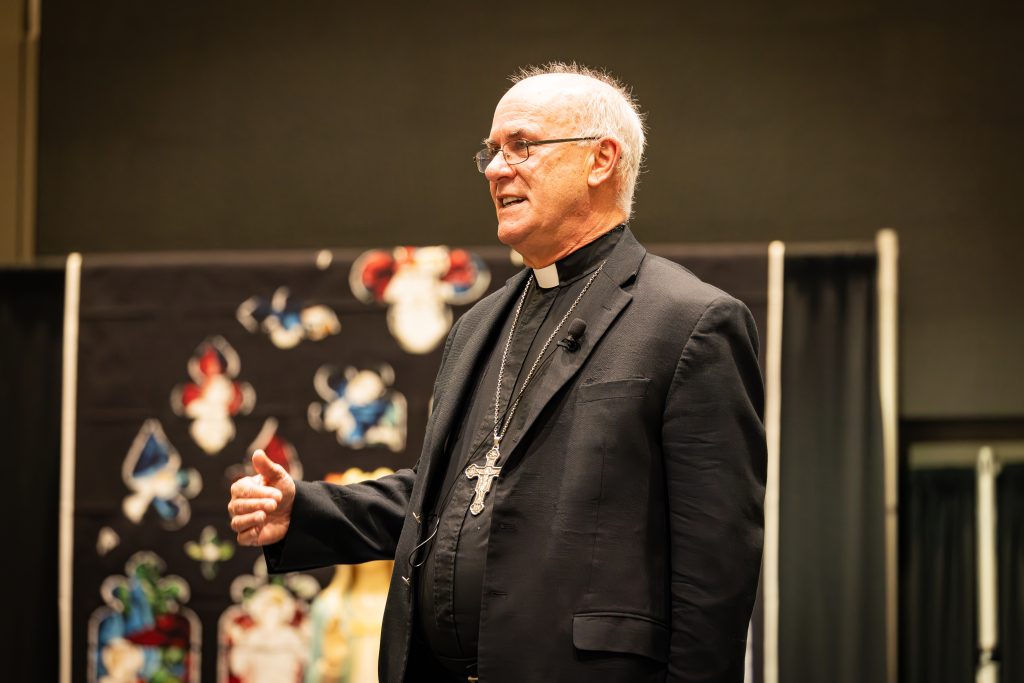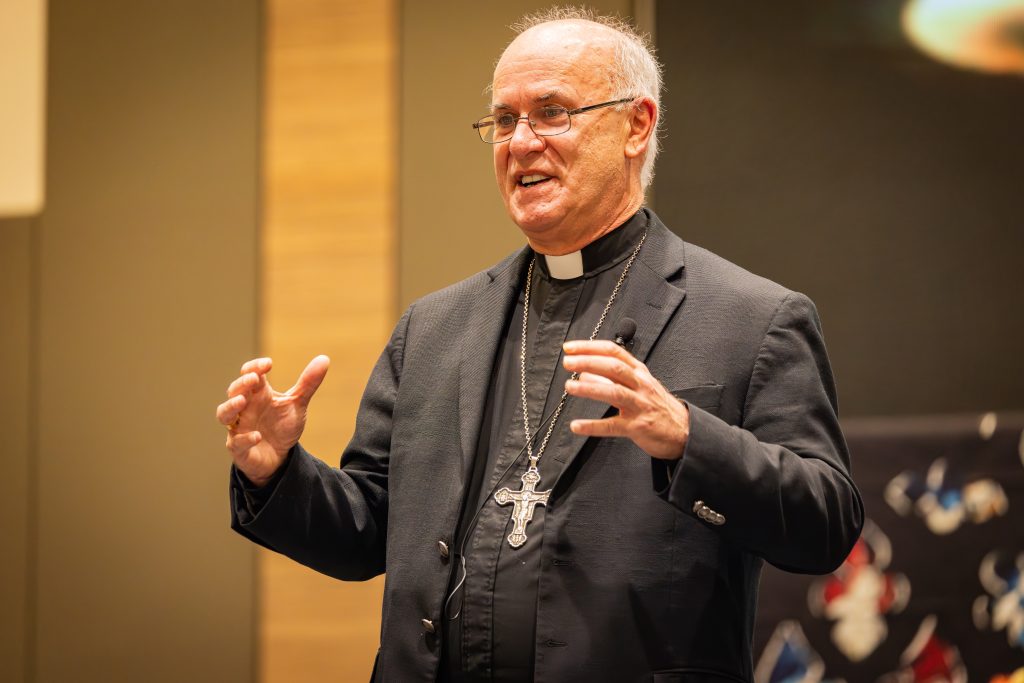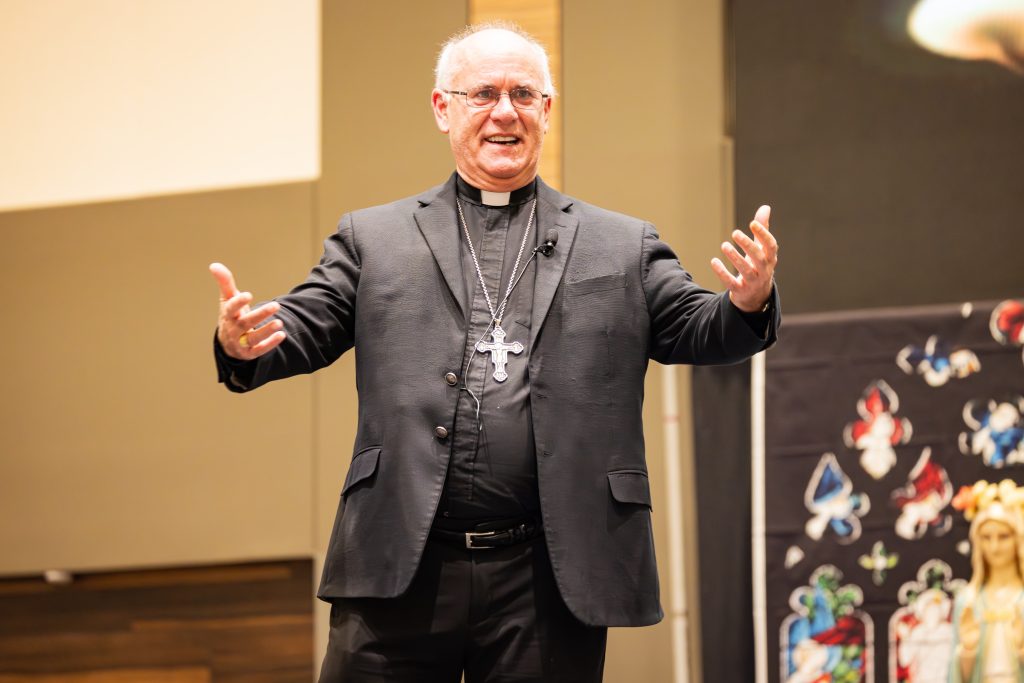February 27, 2024 // Bishop
Bishop Holds Up Abraham, Paul, Peter, James, and John as Examples of Faith at Rekindle the Fire Mass
The following is the text of Bishop Rhoades’ homily during the Mass for attendees of the Rekindle the Fire men’s conference in Fort Wayne on Saturday, February 24.
My brothers, you came here today because you are men of faith who desire to be strengthened in your faith, to be educated in the faith, and to grow in your faith. “To live, grow, and persevere in the faith until the end we must nourish it with the word of God and we must beg the Lord to increase our faith” (Catechism of the Catholic Church, No. 162). Let us consider God’s word in the readings today that nourish our faith. In fact, the Scripture readings we just heard give us examples of faith to help us and inspire us in our journey of faith.
We have Abraham whom we call “our father in faith,” and we have the great apostle St. Paul. What St. Paul wrote to the Romans is a testament of his indominable faith: “If God is for us, who can be against us?” Paul firmly believed that God was for him and with him. That conviction gave him strength to persevere in his mission, to suffer for the sake of Jesus, and to even die for Him. We know about the many tribulations Paul endured. He was beaten; at one point he was nearly stoned to death; he was imprisoned; he was shipwrecked. How was St. Paul able to endure? Certainly, it was God’s grace that sustained him, the grace that he opened his heart to receive and that inspired him to believe that God was with him, that God loved him. It was the faith expressed in those words: “If God is for us, who can be against us?” But why did St. Paul believe this? He tells us why. He writes: “If God did not spare His own Son but handed Him over for us all, how will He not also give us everything else along with Him?” Paul believed in God’s love revealed in His giving His beloved Son for our salvation, in handing over His Son to death to take away our sins. He trusted God and so was able to persevere through suffering with this deep conviction of faith in God’s love – the love that defeats sin, the love that triumphs, as evidenced by the Father raising His Son from the dead.
The other model of faith for us today is Abraham. We heard in the first reading the famous story of the sacrifice of Isaac. I prefer to call it “the sacrifice of the ram,” because even though Abraham was willing to offer his son in sacrifice, God stayed his hand, and the sacrifice was actually the ram that was offered up as a holocaust in place of Isaac. Clearly, God does not approve of human sacrifice, which was done in some religions at that time and in history.
Abraham had the strong faith that Paul had so many centuries later. Abraham had also believed that if God is for us, who can be against us? That’s why he was willing to obey God’s command to offer up his son Isaac as a sacrifice. Abraham was willing to do this because he trusted in God, that somehow God would fulfill His promise of descendants and, if necessary, raise Isaac from the dead. Of course, as we know, God was testing Abraham’s faith, and Abraham passed the test. As a result, God made the promise, the oath, that was the final form of the covenant with Abraham, that He would “bless Abraham abundantly and make his descendants as countless as the stars of the sky and the sands of the seashore.”
Abraham is a model for us of walking with God throughout our lives in a relationship of faith, with trust in God even if we don’t understand why some things happen in our lives that don’t seem to make sense. Certainly, God’s command to Abraham to sacrifice his son Isaac made no sense, but Abraham still trusted God. St. Paul pointed this out in his letter to the Romans, where he wrote: “Abraham believed, hoping against hope, that he would become ‘the father of many nations.’ … He did not doubt God’s promise in unbelief; rather, he was empowered by faith and gave glory to God and was fully convinced that what He had promised He was also able to do” (Rom 4:18, 20-21).
We heard in the Gospel today St. Mark’s account of the Transfiguration of Jesus. I have spoken about the faith of St. Paul and Abraham, but what about the faith of Peter, James, and John, the three fishermen called by Jesus to be His disciples and apostles and who were Jesus’ inner circle? They, too, were on a journey of faith, but a pretty rocky one. I think we can all relate to them.
I’ve really enjoyed watching the series “The Chosen.” I’ve watched the first three seasons and am looking forward to watching the fourth season. I love how the series, based on what we read in the Gospels, with creative imagination, presents the Twelve Apostles and their different backgrounds, different strengths and weaknesses, and different personalities, especially of the three closest to Jesus: Peter, James, and John. As men, I think we can especially relate to their naturally masculine strengths and weaknesses.
Think about the brothers James and John. These Galilean fishermen had especially strong personalities. Remember when they were traveling with Jesus to Samaria. Jesus sent a messenger ahead to find a place for them to stay. He came back and told Jesus that they were refused because they were Jews. What was the reaction of James and John? They were indignant that Jesus was being rejected, so they asked Jesus to call down fire from heaven to consume them! Their zeal was impetuous, like Elijah, who called down fire from heaven to consume his enemies. Of course, Jesus rebuked them. He had to correct them. Clearly, James and John needed further training in discipleship. They needed to grow in spiritual maturity. I think we can all relate to that. We all need further training in discipleship. That’s why you came here today.
James and John had good manly qualities, but they had bad tempers sometimes and were quick to anger. Not without reason, Jesus nicknamed them “the sons of thunder.” With their tempestuous natures, they wanted to obliterate an entire village with firebombs from heaven. It’s good that they were strong in character, zealous for Jesus, and firmly convicted – good masculine virtues. But they needed to learn to channel these virtues in the right direction as disciples of Jesus.
James and John, so zealous for Jesus, also had a pride that needed to be overcome. Remember, they once asked Jesus, as their mother had also asked Jesus, that they be granted the privilege of sitting on His right and left in the glory of the kingdom. This obviously really annoyed the other apostles. Jesus went on to teach James and John that whoever wishes to be great must be the servant. James and John had to learn to conquer their pride and to grow in humility.
What about Simon Peter? He had such great natural virtues, especially virtues for leadership. But he really needed a lot of training from Jesus! Talk about needing to channel correctly one’s masculine gifts! Think about Peter’s character: active, enthusiastic, determined, and self-confident. He was a leader – he took initiatives. No wonder Jesus chose him to be the rock, the leader of the apostles and of the Church. But Peter was also impulsive, quick to anger, and sometimes overly self-confident. He was quick to jump to extremes. He got into trouble from time to time, and Jesus needed to rebuke him. Remember when Peter tried to rebuke Jesus when Jesus gave the first prediction of His passion? Jesus rebuked Peter and called him Satan because he was basically steering Jesus away from His mission. Remember also when the soldiers came to arrest Jesus in the Garden of Gethsemane. Peter drew his sword and cut off the ear of the high priest’s servant, Malchus. Jesus had to tell Peter to put his sword back into its scabbard. He said to Peter, “Shall I not drink the cup that the Father gave me?” Of course, the worst thing Peter did was when he was in the courtyard of the high priest and denied being a disciple of Jesus. The cock crowed, and Peter realized the great sin he had committed. He broke down and wept. He was heartily sorry for having offended Jesus, and he repented. He detested the sin he committed. After the Resurrection, Jesus questioned Peter about his love for Him. Peter professed his love, and Jesus not only forgave Peter, He also confirmed the mission He had given Peter to be the shepherd of His Church.
There are many other episodes about Peter and his mistakes, and also his growth in maturity, but there’s not enough time to recount them in this homily. Jesus had great plans for Peter, James, and John, His inner circle, so He manifested His glory to them at the Transfiguration. He was strengthening them for their mission, especially since He knew that His upcoming passion and death would be a trial for them.
Peter, James, and John did go on to do great things. They grew as Jesus’ disciples into great leaders and great witnesses of the Lord, great saints. They learned to channel their natural dispositions in the right direction. Of course, they also received the gifts of the Holy Spirit at Pentecost to help them. Peter became the great leader of the Church, as we see in the Acts of the Apostles. James became the first of the Twelve Apostles to be martyred. John, the beloved disciple, would write the deepest and most penetrating of the four Gospels. By the grace of God, Peter and the sons of thunder were able to overcome their weaknesses and become saints. They are great examples for us, as are Abraham and St. Paul. In this grace-filled season of Lent, may our sacrifices help us to grow, like Peter, James, and John grew, to become the men, the disciples, and apostles, that Jesus calls us to be!
The best news. Delivered to your inbox.
Subscribe to our mailing list today.









